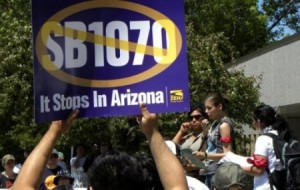
Being lauded as a hero for offering aid that potentially saved Congresswoman Gabrielle Giffords’ life, the young intern who rushed to her aid, Daniel Hernandez, could have been asked to turn over his papers under Arizona’s controversial immigration law, SB 1070.
Signed into law by Governor Jan Brewer last spring, the law requires that law enforcement officials check the legal status of anyone they detain during the course of a crime if they have reasonable suspicion that they are in the country illegally. Its passage drew outcry from civil rights advocates and the White House alike who warned of potential racial profiling particularly against Latinos in the state (La Plaza).
“If you are a witness for a crime, the officer would have a lawful reason to approach you, and if they had any reason to suspect you might be an alien, they could ask,” Aarti Kohli, director of immigration policy at Berkeley Law School’s Warren Institute, said. “The big question is what is reasonable suspicion.”
Hernandez, who is Mexican-American, was questioned by police following the Saturday’s shooting in Tucson. As signed into law, SB 1070 might have forced him to prove his citizenship if one of the officers suspected he was undocumented.
Albeit, these parts of the law have been blocked by a federal judge from going into effect, but Gov. Jan Brewer is fighting to have the law completely implemented.
The damaging effects the law might place on Latino and police relations were cited as a chief concern against the legislation.
Many undocumented immigrants already feel deterred from reporting a crime committed against them for fear of deportation and the law might only serve to aggravate this problem.
Proponents of SB 1070 say their aim is to reduce crime committed by undocumented immigrants but the evidence is slim that rates of violent crime are higher when more undocumented immigrants are present. In fact, a 2008 California study found that crime rates actually fell as the undocumented population increased, and overall the crime rate in Arizona had decreased since 2002.
The court has yet to make a ruling on the state’s appeal over the law.

Recent Comments